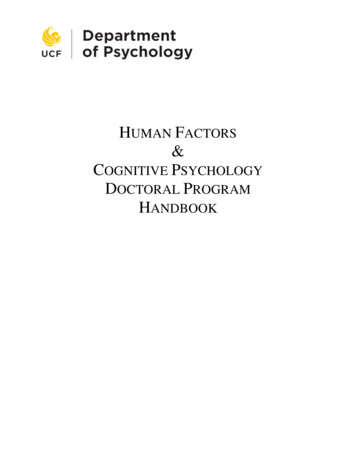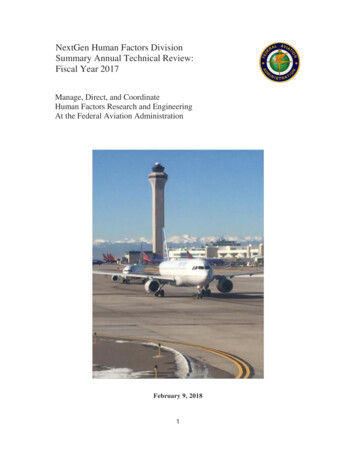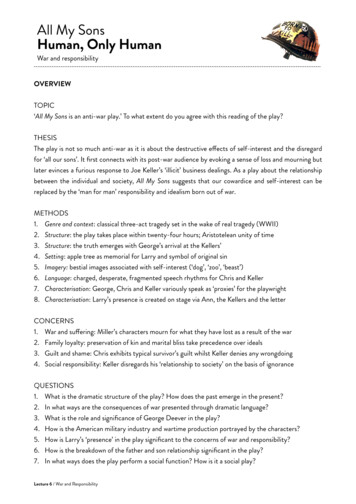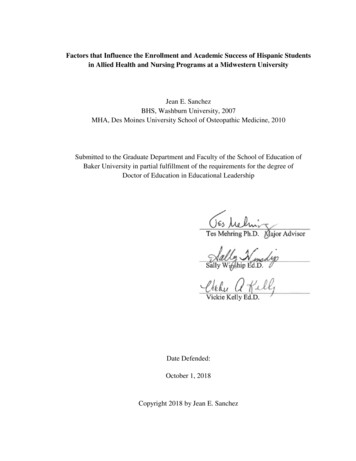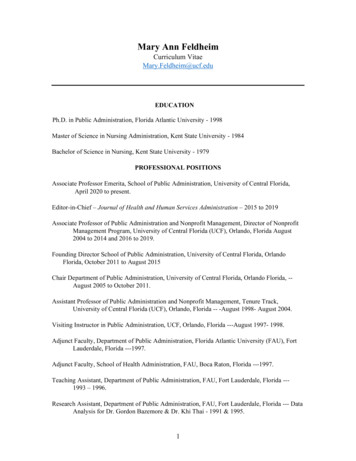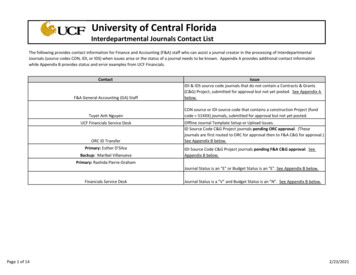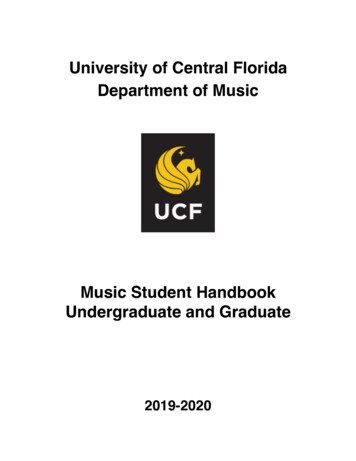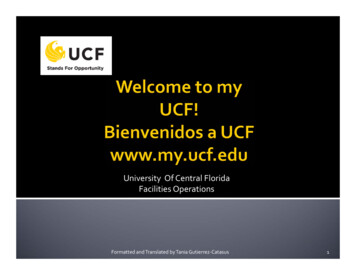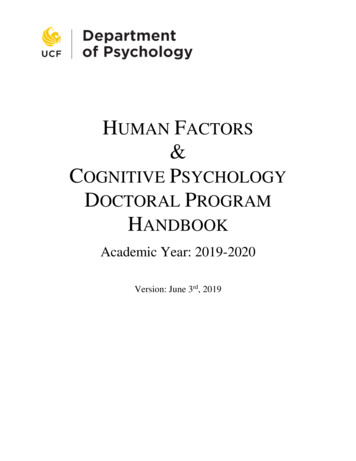
Transcription
HUMAN FACTORS&COGNITIVE PSYCHOLOGYDOCTORAL PROGRAMHANDBOOKAcademic Year: 2019-2020Version: June 3rd, 2019
2TABLE OF CONTENTSWelcome . 41. Introduction . 5About Human Factors & Cognitive Psychology . 5Contact Information . 5Additional Student Resources . 62. Mission Statement. 73. Advising and Mentoring . 7Expectations of Doctoral Students . 8Changing Academic Advisors . 84. Degree Requirements . 8A. Course Requirements . 8Doctoral Program in Human Factors & Cognitive Psychology Required Courses . 9Total Hours Required for Ph.D. — 75 credit hours . 9B. Competency Requirements . 11Table 1. Professional Activity/Competency Requirements . 11C. Timeline for Completion of Degree Program: 5 Year Schedule . 17Doctoral Program Courses: . 17D. Graduate Research: Doctoral Dissertation . 19Program Guidelines . 19Dissertation Committee Composition . 20E. Time Limitation and Deadlines for Dissertation Completion . 20F. Masters of Arts (en Route) . 205. Departmental Policies . 21A. Student Rights and Responsibilities. 21B. Academic Progress and Performance . 21Review of Academic Performance . 21Graduate Status GPA . 21Probationary Status and Dismissal. 22Maximum Hours of Unsatisfactory Grades . 23Incomplete Grades . 24Academic Honesty and Ethics . 24C. Full Time Enrollment & Continuous Attendance . 25D. Special Leave of Absence . 25E. Readmission . 26F. Restricted Registration. 26G. Transfer Coursework. 27H. Incomplete Grades . 27I. Withdrawal Policy . 27J. Petitions and Grievances . 27Petitions of Graduation Requirements Procedures . 286. Professional Development . 29Work Policy . 29Special Award Recognition . 30UCF professional development programs . 317. Financial Support . 33International Students . 33Assistantships and Tuition Waivers . 33GTA Training Requirements . 34GTA Performance Appraisal . 34
38. Graduation.349. Miscellaneous . 35Student Support Services . 3610. Forms . 38Transfer Request Form . 38Traveling Scholar Form . 38Time Conflict (College Form) . 38Dissertation Committee Approval Form (College Form). 38Committee Composition: . 38Graduate Petition Form . 39Graduate Student Intent to Graduate Form . 39Appendix A. Specialty Training Emphasis/Research Labs & Opportunities . 40Other Research Opportunities available: . 41Appendix B. HFC Faculty and Staff . 43
4WelcomeWelcome to the Human Factors and Cognitive Psychology (HFC) Ph.D. Program! You are aboutto embark on a great intellectual adventure, one that will be demanding but, we hope, rewarding.You will find many opportunities to self-actualize in this program. Be sure you maintain yourfocus on learning as much as you can about psychological theory and research, both in theclassroom and especially in your laboratory research with your advisor.Like most rigorous Ph.D. programs in psychology, the HFC program follows the apprenticeshipmodel, in which the student is trained in the skills of research and scholarship by an advisor whoworks closely with him or her. Our program also follows the APA ‘scientist-practitioner’ model,in which the goal is to train our graduates in the science of human factors and cognitivepsychology and also to train them to apply the science to improve human-technology interaction.Like most things in life, how much you gain from graduate school varies directly with how mucheffort you put into it. If you work hard, remain focused on your research program with youradvisor, and make the most of the opportunities in our Program, you will do well both at UCFand after graduation.Good luck in your scholarly endeavors,James L. Szalma, Ph.D.Associate ProfessorDirector, Human Factors and Cognitive Psychology Ph.D. ProgramDepartment of Psychology
51. IntroductionThe UCF Graduate Catalog is the University’s official record of graduate policies. In any casewhere this handbook appears to disagree with the Graduate Catalog, the Graduate Catalog is thefinal authority. The Graduate Catalog may be accessed via the UCF website at:http://www.graduatecatalog.ucf.edu/About Human Factors & Cognitive PsychologyThe fields of Applied Experimental Psychology, Human Factors, and Ergonomics adopt amultidisciplinary approach to the study of the interaction between humans and the environment,including systems, products, people, and procedures. Human Factors, as one of the coredisciplines of the track, is a science that adds the human into the equation to make life easier,safer and more enjoyable by applying psychological theory and research to human-centereddesign. A well known Human Factors textbook describes the field in the following quotation.“Human factors is the application of scientific knowledge and principles to the design ofproducts, systems, and/or environments. The goal of human factors is making the humaninteraction with systems one that: reduces error, increases productivity, enhances safety,and enhances comfort. Human Factors then involves the study of factors anddevelopment of tools that facilitate the achievement of these goals” (Wickens, Gordon,and Liu, 1998, p. 2).As scientific disciplines, Human Factors and Cognitive Psychology overlap with areas such asEngineering Psychology, Social Psychology, Cognitive Psychology, Industrial/ OrganizationalPsychology, Cognitive Engineering, Ergonomics, and Industrial Engineering. Human Factorsresearchers and practitioners work in areas such as automation, cognition, decision-making,display processing, human-computer interaction, physiology, safety and human error, sensationand perception, sensory systems, stress, workload, training, transportation, and workspace design.Contact InformationDepartment Chair: Florian Jentsch, Ph.D.Telephone: 407-823-3576e-mail: Florian.Jentsch@ucf.eduProgram Director: James L. Szalma, Ph.D.Telephone: 407-823-0920e-mail: James.Szalma@ucf.eduHFC Program Assistant: Mikala ArmioiaTelephone: 407-823-4601e-mail: Mikala.Armioia@ucf.edu
6College of Sciences Academic Services - Graduate OfficePhone: (407) 823-6131E-mail: cosgrad@ucf.eduDr. Michael JohnsonDeanPhone: 407-823-3491E-mail: Michael.Johnson@ucf.eduDr. Tosha DuprasInterim Associate DeanDirector of Graduate ServicesCOSASPhone: 407-267-3384E-mail:Tosha.Dupras@ucf.eduTonya WalkerCoordinator of Graduate ServicesCOSASPhone: 407-823-3898E-mail: Tonya.Walker@ucf.eduAdditional Student Resources UCF Graduate Catalog http://www.graduatecatalog.ucf.edu/COS Graduate Website for Students http://graduate.cos.ucf.eduUCF Graduate Website for Students http://www.graduate.ucf.eduAcademic Calendar: http://www.ucf.edu/info/acad calendar.phpLibrary http://library.ucf.edu/Graduate Student Association http://www.gsa.graduate.ucf.edu/University Writing Center http://www.uwc.ucf.edu/The Counseling Center http://counseling.sdes.ucf.edu/
72. Mission StatementA Ph.D. professional degree track in Human Factors & Cognitive (HFC) Psychology is offeredto those with a baccalaureate or master’s degree in psychology or an allied area. The track seeksto develop the capacity to design, conduct, and apply applied experimental and human factorsresearch in a variety of professional settings. It is patterned on the scientist-practitioner model ofthe American Psychological Association (APA) and adheres to guidelines established by thecommittee for Education and Training of APA’s Division 21 (Applied Experimental andEngineering Psychology). The track has been accredited by the Human Factors and ErgonomicsSociety (HFES).Students receive training in the content and techniques of human factors psychology-includingstatistical and quantitative procedures, experimental design, survey methods, computertechniques, and other research methodologies. Students also select a concentration area, whichthey complete as part of their required elective coursework. Examples include human-computerinteraction, human-machine-environment interface, human performance, human factors insimulation and training, cognitive neuroscience, or other areas of interest with advisorauthorization. In addition to the course requirements students must demonstrate their knowledgeand skills by completing the five competency domains. Finally, a dissertation representing asignificant research contribution to the field is required.Consistent with the Department’s Mission Statement, the HFC Doctoral Program’s overall goalsare to:1) Train and educate leaders in Psychology at the doctoral level within the scientistpractitioner tradition2) Facilitate the exploration and understanding of the complexity of human behavior whileexpanding our collective knowledge base through multiple avenues (e.g., publications inscientific journals, conference presentations, teaching)3) Strive to improve the health and quality of life of individuals through excellence ineducation as well as in research and practice in human-technology interaction.The overall philosophy that drives these goals is embodied in the policy statement that emergedfrom the National Conference on Scientist-Practitioner Education and Training for theProfessional Practice of Psychology held in Gainesville, Florida on January 16-20, 1990. Thetraining model of the HFC Doctoral Program reflects our efforts to educate students so that theycan advance psychological knowledge through research and scholarship, and to evaluate theimpact of training regimens and interface designs using empirically derived methods andprocedures. The model also strives to help students learn how to think critically and scientificallyabout problems while invoking the highest standards of ethical and professional conduct. Theoverall philosophy of the training program is consistent with that of the Mission Statement of theDepartment, the College of Sciences, the Graduate School, and the University(http://www.ucf.edu/mission/).3. Advising and MentoringEach student entering the HFC program will be assigned an advisor who will supervise thestudent’s research activities and serve as a mentor to the student. Students are assigned to anadvisor based on program fit and research interests. A formal relationship with an advisor mustbe established by the end of the first semester in the program by completing a form signed by
8both the student and the advisor. Subsequent changes in advisors must be accomplished byfiling a petition with the Program Committee (see below). The performance of each graduatestudent will be evaluated annually at the beginning of the Fall semester by his/her advisor anddiscussed among the HFC faculty. The purpose for these evaluations is to identify areas ofstrength and accomplishments as well as those skills in need of further development. Studentsare expected to meet with their academic advisor on a regular basis to discuss their academic andprofessional progress.Expectations of Doctoral StudentsGraduates of the program are expected to demonstrate specific competencies in research andpractice that prepare them to function independently in a variety of roles and settings relevant tothe practice of HFC. Graduates are expected to independently generate new knowledge andcontribute to extant knowledge in psychology through publication and presentation of originalresearch. They also are expected to be erudite consumers of psychological and psychologicallyrelated research findings, and to have the skills to utilize this knowledge and future researchfindings when they become human factors professionals.For general policies regarding students’ responsibilities, please see the section titled, ‘Student’sResponsibility’ in the Graduate Catalog, located under General Policies, at:http://www.graduate.ucf.edu/currentGradCatalog/ Policies General Graduate Policies Student Responsibilities.Changing Academic AdvisorsSome students may wish to change their advisor for a variety of reasons, a common one being achange in student research interests. If a student wishes to change his/her faculty advisor, thestudent must submit a written petition to the Program Committee indicating the reason forrequesting the change. Prior to submission to the Program Committee, the student MUST obtainthe signatures of his/her current advisor AND the faculty member who would serve as the newadvisor. Both faculty members must agree to the change. A student may not submit such apetition more than one time per academic year.4. Degree RequirementsStudents are required to meet with the program assistant within the first two weeks of eachsemester to confirm that their status and progress in the program is documented accurately. Thisincludes verifying the accuracy of their competency binder as well as the progress of ABDstudents toward completion of their dissertation. Note that students are responsible for ensuringthat their competency binders are accurate and up to date.A. Course RequirementsThe Ph.D. is designed to be obtained in 5 years of full-time study from the baccalaureate leveland in 3 years from the master’s level. (A minimum of one year full-time student status isrequired.) For students who enter with a baccalaureate degree, the program requires a minimumof 75 credit hours. Students who enter with a master’s degree will be granted up to 30 hours oftransfer credit with approval of the program faculty, and will also be required to complete aminimum of 60 credit hours at UCF.
9Doctoral Program in Human Factors & Cognitive Psychology Required CoursesTotal Hours Required for Ph.D. — 75 credit hoursRequired Courses—42 Credit Hours EXP 5256 Human Factors I (3 credit hours)EXP 6257 Human Factors II (3 credit hours)EXP 6258 Human Factors III (3 credit hours)EXP 5208 Sensation and Perception (3 credit hours)EXP 6116 Visual Performance (3 credit hours)EXP 6255 Human Performance (3 credit hours)EXP 6506 Human Cognition and Learning (3 credit hours)EXP 6541 Advanced Human-Computer Interaction (3 credit hours)INP 7089 Human Factors Professional Issues (3 credit hour)Either PSB 6328 Psychophysiology (3 credit hours) or PSB 6348 The NeuroanatomicalBasis of Psychological Function (3 credit hours) PSY 7217C Advanced Research Methodology I (4 credit hours) PSY 7218C Advanced Research Me
7 2. Mission Statement A Ph.D. professional degree track in Human Factors & Cognitive (HFC) Psychology is offered to those with a baccalaureate or master’s
